I just have a lot of feelings. Mainly about the Batfamily.
Don't wanna be here? Send us removal request.
Text




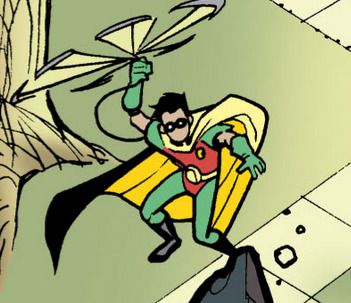




hello have u thought about baby tim today. have u? u should. look at him. 2 apples tall MAX and he ain’t growing but don’t tell him
453 notes
·
View notes
Text
Cats getting caught doing crimes
90K notes
·
View notes
Text
they call me DC Comics cause I also divide my life into pre and post crisis
8K notes
·
View notes
Text



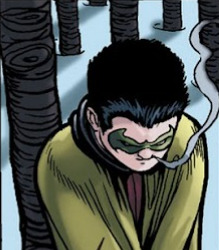
big fan of whenever robin does this
batman and robin: year one (2024) #3, tales of the teen titans (1984) #79, world's finest (2012) #7
208 notes
·
View notes
Text
This is very real. Consider yourselves warned.
once you hit adulthood a day will come when you’re suddenly like VEGETABLES 🔥 🔥 🔥 🔥 🔥 and it never goes away
94K notes
·
View notes
Text
that's because you've never experienced the epic high and lows of comic reading
1K notes
·
View notes
Text
Sometimes one must lie awake and think about Helena Bertinelli, who was taken in after her family was killed and taught to channel her fear into violence and a drive for revenge, versus Dick Grayson, who was taken in after his family was killed and taught to channel his anger into a drive for justice (also accomplished through violence, albeit a more mild version).
And sometimes one must think about the complicated relationships that each has with Batman and what that means in regards to their vigilantism. How both value his respect so highly and want to impress him, but at the same time don’t want to be like him and can’t be like him.
And sometimes one must think about how they both knew the pain of losing a brother, but chose to find one in Tim’s Robin anyways. Or how they both managed to juggle jobs and vigilante roles at the same time. Or how much compassion they can both show to those that need it.
But above all, one must think about how they used to be cool, like, 20 years ago.
202 notes
·
View notes
Text
The Bats Are Fighting (Distaff Edition)
some conflicts I enjoy:
Babs is pretty hostile/judgy toward Helena at first & is bitterly upset and hurt when Helena starts wearing a Bat costume - apparently a Batgirl costume - without asking her. Later on, Bruce chases Helena out of the costume, and Babs gives Cass the Batgirl costume with her explicit blessing. Helena and Cass never have a rivalry over this exactly, but I don't think they ever really get along, either
Babs and Helena eventually make up when Babs lets Helena join the Birds of Prey but it's rocky in the beginning - Babs dislikes Helena's methods and doesn't entirely trust her; Helena resents being kept on the outside
Steph is super-impressed by Cass and tries to get her to like her and they eventually get close, but Cass has a pretty low opinion of Steph-as-a-vigilante and doesn't hesitate to boss her around or knock her out, and she's super-hurt by Steph lying to her about what's going on during War Games (probably not unrelated: Cass is the only Bat to blame Steph instead of Bruce after Steph dies)
Babs and Cass get very close but also have tensions because Babs wants Cass to have the 'normal' life that Babs thinks she should've tried harder to have when she was younger, and Cass isn't entirely comfortable with this pressure, plus - this one I think is a bit more well-known - Babs spends a lot of time tutoring Cass and looking after her (awww), BUT ALSO in a tense moment she gets really nasty and harsh about Cass's reluctance to learn to read and calls her "stupid"
Dinah finds Steph REALLY annoying and wants her to stop tagging around after her... until she finds out about Steph's miserable home life, and then she appears like an avenging angel and kicks Steph's dad and his cronies out of the house
Babs decides to work with a guy who tortured Dinah because she thinks he's capable of redemption and Dinah is NOT HAPPY about it
Just generally, Steph and Helena are very much outsiders who don't get brought into the "core" Batfam and who aren't trusted with info like Bruce's secret identity. By contrast, Babs is an insider almost from Day 1 - she may have conflicts with Bruce, but she's also got his absolute trust - and Dinah is as insider as it gets, with a mom who was also Black Canary and a stint on the JLA
other general characterization notes that cause Conflict (TM):
Babs is pretty much a classic Bat - she's got a ton of control issues and she's an instinctively secretive workaholic
Helena is an adult who will kill people if she damn well feels it's necessary and she doesn't appreciate being lectured about it
Steph is a defensive teenage outsider with a bucketload of family problems - deadbeat evil dad! addict mom! - and when she's upset she's got a reckless self-destructive streak
Cass is very much like Bruce in that 1) she is wildly super mega good at fighting, 2) she's an instinctive loner who's comically bad at people AND YET she can nevertheless effortlessly manage to head off to a foreign country for a weekend and have a passionately-felt mutual love affair with some random criminal or something, and then that person dies & she goes home like nothing happened, 3) she cares about other people but completely sucks at communication & when in doubt will just go silent & take off or refuse to have conversations, 4) because she hates talking sometimes she'll just knock you out or hit you so that she won't have to do it, 5) she will spend an entire year planning to have a fight to the death with someone for Reasons and tell no one about it because why would she tell someone
anyway they're all terrible <3
290 notes
·
View notes
Text

Dickie saying, "Ta-da!" after saving his own life, with no one actually around to see him or hear him (that he knows of), is so darling to me. Performer at heart.
499 notes
·
View notes
Text
I love when you’re reading multiple fics by the same author and you start to spot all the phrases and adjectives they like to use
103K notes
·
View notes
Photo

FINGERSTRIPES
16K notes
·
View notes
Text
Something critical is that probably the real dick grayson would absolutely never ever casually call BW Dad to his face, and truthfully even post-adoption in GK#17 the father-son thing is only like 49% of the Bruce & Dick rs although dick absolutely does lasso bruce into conversations as in “oh my dad does the same thing!” when hes having conversations w total strangers faraway from anywhere on the eastern seaboard where word could never get back and associations could not be made BUT WITH ALL OF IT SAID THAT DICK WOULD NEVER CALL BRUCE DAD TO HIS FACE, in Bruce’s like deepest, most potent fantasies, like daydreams and nightdreams and also canonically that issue where bruce is in that feartoxin dreamscape world in Batman/superman #65 where his parents are alive and bruce is romantically stable and dick is his son, Dick absolutely, and invariably, calls him Dad. But that element absolutely isnt on the table in the real world at all. It isnt even that Bruce Wants That—he doesn’t want a change to the very precarious working current order, not even a very small one bc its very precious & risk aversion reasons—but it’s also like a satisfying recognition of some real under-the-surface order in the world that bruce perceives but which just isnt in play in the real world. But it is something explicit and certain in Bruce’s head and something that Bruce is aware of. And sometimes he like closes his eyes and thinks of it or something.
395 notes
·
View notes
Text
#yessss spelunking spelunking bring back spelunking!!!!! (@silverwhittlingknife)

He cuffed his jeans to show his bisexuality
650 notes
·
View notes
Text
everything in this life is temporary. except that fandom hyperfixation from when you were 14. that thang will be with you forever there's no escaping.
50K notes
·
View notes
Text
HOT DAMN THIS IS SO GOOD
Everything goes back to Jason. Ev-er-y-thing.
How Batman uses the idea of those "born for" vigilantism to justify working with Teen Vigilantes before and after the death of Jason Todd, and what it has to do with Stephanie Brown.
(DISCLAIMER: I'm not trying to condemn the concept of child/teen vigilantes in superhero comics, its a staple of the genre and dumb to condemn it like you would in the real world. I'm analyzing the times in which Bruce Wayne the character has questioned the concept himself, and the rationalizations he comes to about it)
By examining Bruce Waynes mindset immediately before, during, and after Jason Todd's deadly time as Robin, we can see how Batman rationalizes and justifies teenaged vigilantism.
When Dick Grayson as Robin is shot by the Joker, Batman essentially fires him from being Robin. Bruce entirely dismisses the concept of working with a "child" to fight crime. Batman seems to believe working with Dick as Robin is simply too dangerous.

Batman #408 (1940)
His Mindset at this point: Teenaged Vigilantism = Dangerous and Bad
But this, obviously, doesn't stick. It barely takes any time at all after this forBruce Wayne to take in Jason Todd and subsequently make him the second Robin.
Crime fighting with a 19 year old is too dangerous, but crime fighting with the 12 year old? Yeah, sure, why not!
There is an obvious contradiction, and a clear change in mindset.
In order to rationalize his choice to take in Jason Todd as Robin after firing Dick, Bruce Wayne must internally reendorse the concept of Teenaged Vigilantism. And he does so in a specific way:

Batman #410 (1940)
Mindset: If Jason Todd was not Robin, he would become a criminal and die
The dying part is specific as well. When confronted at first by Alfred, its more of an afterthought, something which would occur down the criminal "road" Jason was bound to end up on. But when he is later confronted by Dick, the idea that being Robin "saved" Jasons life takes center stage.

Batman #416 (1940)
It's no longer some distant crime related death Jason was on course for, it was an imminent death which Bruce was able to save him from.
Mindset: If Jason Todd was not Robin, his "self destructive energies" and lack of "self esteem" would have killed him.
This phrasing is SUPER interesting to me, because its not true in a very specific way.
1. Jason Todd wasn't really shown to have "Self destructive energies" before he became Robin. He was stealing to make a living, to stay alive. He never showcases a desire for "self destruction", unless you count his hitting Batman with a tire iron, and his interference in Ma Gunn’s heist. Which I don't.
2. It seems to imply Jason Todd might have died because of specifically "self destructive tendancies", which seems ascribes a small amount of passive potential suicidal ideation, which is also vastly unsubstantiated by anything we see from Jason before he becomes Robin. But you know who is a character who is deeply rooted in concepts of suicidal ideation? Batman. (I'm not going prove this point here, but this concept gets more firmly rooted in the upcoming years after this comic, Knightfall being a great example) Being Batman, Knightfall will establish, is pretty much all that keeps Bruce Wayne living. You could say that being Batman saved his life.
3. Bruce admits he took Jason on because he was lonely in this very same confrontation when Dick pushes him on this idea. This makes it abundantly clear why he needs this rationalization in the first place, his real reason for making Jason Robin appears to be somewhat selfish.
But what does this all mean? For one, it proves that Batman's primary explanation for why he took on Jason Todd is lowgrade BS. It also shows how Batman's rationalization has begun to veer into projection. He states that Jason was saved from his self destructiveness by becoming Robin, something that is certainly true for himself, but not really Jason.
We see this projection fully take root when Leslie Thompkins confronts Bruce. Not only is Jason Todd saved by becoming Robin, now he wasn't even chosen by Batman. It was, much like Bruce Wayne becoming Batman, inevitable. Something he was "born" to do.

Detective #574
Mindset: I didn't chose Jason, he was chosen, he is just like me, we were born for this
This is essential. This mindset will show up again and again as a core part of Bruce's ability to rationalize working with child vigilantes once Jason has died.
Lets look at how his mindset has been evolving from before he meets Jason to his time as Robin progressing. Batman has gone from:
Teenage/Child vigilante Bad --> Child Vigilante Good because Jason would have become a crimial --> Child Vigilante Good because Jason would have died, I saved his life --> Child Vigilante is Good because I saved his life and Jason was meant to be Robin just like I was meant to be Batman, this is what we were was born to do
This is insane rationalization. But it works. For a while.
Then, Jason begins acting out, and putting himself in danger. Whoops. uh oh! How can Jason be saved by becoming Robin, if he is endangered by it? The balm for Bruce's semi-suicidal ideation was crime fighting, so if Jason is self destructive as Robin, does that mean Jason isn't like Bruce after all? Does that mean he wasn't born to be Robin? Was Bruce right in the begining? Is Teen Vigilantism Bad? Well, lucklily, the rationalization Bruce has built doesnt need to change too much in order to accommodate these new facts.

Batman #426 (1940)
See, this issue has not reverted back to being child vigilantism, it's the fact that Jason isn't ready yet.
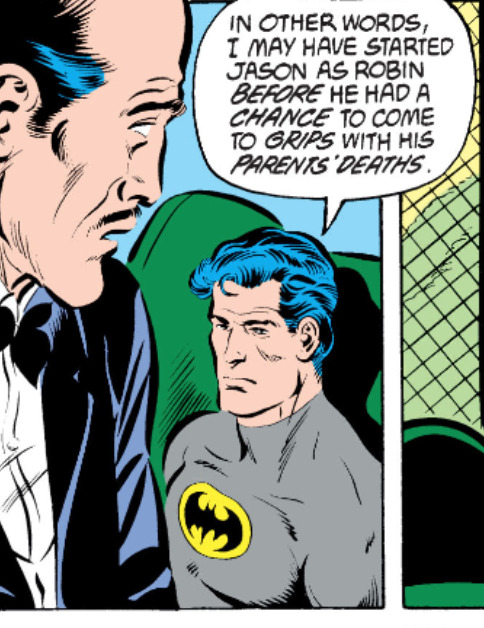
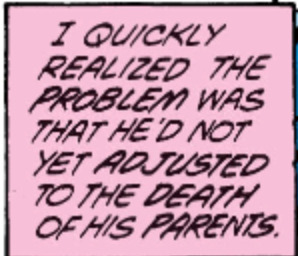
Batman #426 (1940) / Batman #427
Batman latches onto this idea, he identifies it as "the problem". Is he wrong? No, not really. It does seem like Jason needs come to terms with his parents deaths. But this is important because it is still a rationalization for mindset he started with, still part of the reason he can be in favor of Teenage Vigilantism.
Then Jason Todd dies, as Robin. That truly breaks the underlying concept for this rationalization, that being Robin saved Jason Todd. The entire justification has fully shattered, and Bruce Wayne has lost a son. And, so because of this, in the wake of Jason Todds death, we see a full 180 revert back to the idea Bruce held onto at the end of Dick Graysons time as Robin: Teenage Vigilante = Bad.
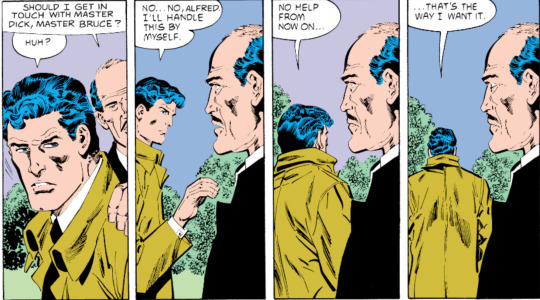


Batman #428/ The New Teen Titans #55 (1984) / Batman #439
He has fully rejected the very concept of working with anyone, including the now adult Nightwing. He is literally right back where we started, with even deeper convictions against working with someone else (especially a kid) ever again.
But we all know this doesn't stick. He takes on 13 year old Tim Drake as Robin not long at all afterwards. As the 90's progress Bruces goes on to work with a huge variety of other vigilantes and partners, both teenaged and adult.
So how does he possibly justify this?
I believe he retrofits his rationalization for taking on Jason as Robin.
He adheres to a primary idea. The idea that some people are, like him, simply built for Vigilantism. That they, much like he once believed Jason was, "born" for it.
Mindset: Child Vigilantle is not always Good, but it can be Good. When its the right kind of teenager. Some Teenaged Vigilantes are meant to be Vigilantes just like I was meant to be Batman.
In this way, Jason Todds tragic murder is not a failure of concept, it a category error. Batmans mistake was not working with a teenager, his mistake was working with the wrong kind of teenager. Jason Todd was not built for vigilantism. But others are. This means he's still totally in the clear to work with teenagers, Tim Drake as Robin, then Cassandra Cain as Batgirl, and then eventually Stephanie Brown as Spoiler. So long as Bruce is able to believe they are "born" for it, that they are like Batman himself, meant to do this, and incapable of living a normal life, there is no contradiction, his rationalization holds.
But where’s the proof?
This mindset can be clearly seen and prominently seen when Stephanie Brown is fired as Spoiler.
When Steph is fired as Spoiler because she has moved in Bruce's mind from the "acceptable Teen Vigilante" category into the "unacceptable Teen Vigilante category". And the reasons he gives for this decision are exactly in line with the rationalization I've lain out. She is consistently contrasted to other teen vigilante characters who are fit for duty because he does not see her as "like him/them".


Detective #790
Notice how he jumps right from "Jason and Stephanie were/are not fit to fight crime" to "they could/can have a normal life" right to "unlike me and you, Cassandra Cain, who are stuck fighting crime forever". Much like how he originally justified his decision to work with Jason Todd as Robin through the idea that Jason and Bruce were both destined for this life, he applies the exact same idea, but this time, about himself and Cassandra Cain as Batgirl. And in contrast to them, and in directly comparison to Jason Todd, Stephanie is not meant for crime fighting.

Batgirl #38 (2000)
And Stephanie Brown is contrasted with Cass again, when Bruce first explains why he fired Steph to Cass. This is a consistent pattern. She is not like Cass. This is why she shouldn’t be a vigilante.
When he explains that he is going to fire Steph as Spoiler to Tim, he says something very interesting which invokes the same idea. In the list of three reasons he throw out that Steph shouldn't be Spoiler, he mentions that she is going to "throw her life away". When taken in combination with the other panels discussed, its clear to me that he means this is the common way the saying is used. That she is wasting her life by being a vigilante, that she should, as he mentions earlier, be living a normal life. But why is he saying this to Tim? If one of the reasons Steph shouldn't be Spoiler is her ability to lead a normal life, why the fuck is Tim exempt? I think it comes from a genuine belief that Tim is "like him". Unable to live a normal, non-vigilante life, "born" for crime fighting. Much like Cass, who we already saw him directly compare himself to in this exact same way. Thats why he can directly reference to Tim Steph's ability to have a normal life as a reason she shouldn't be a vigilante, he doesn't believe Tim fits the same category at all!

Robin #106 (1993)
So why the fuck does Stephanie move categories? She was acceptable earlier? What changed?
I've already done an in-depth explanation for what the subconscious underlying reason Bruce fires Stephanie: she simply is no longer useful to as a balm for his loneliness. I highly recommend checking out the post here if you are interested in the breakdown of why and how.
But in addition to that, it’s clear to me that it also has a weird amount to do with Jason Todd.
Stephanie simply and clearly reminds Bruce of Jason Todd. He points out their similarities in personality, and it’s worth mentioning the similarities in their circumstances as well (mothers who struggle(d) with drug addiction, and fathers who were criminals).
As we saw in Detective #790, their personality similarities led to Batman associating Steph with Jason. This makes sense, this association would only grow as he got to know her over the time she is sanctioned as Spoiler.
I believe this association leads to him eventually placing her in the same category as Jason, as not "born" for vigilantism at all, and as capable of having a normal life.
But it also serves as a clear way to rectify his mistakes with Jason. It’s his way of “making up for” his role in Jason's death. It’s his second chance. Never mind that this second chance leads to his assessment of Stephanie having very little to do with Steph herself, and a whole fucking lot to do about Bruce’s guilt over Jason’s death.
This is especially brutal because it seems to come from a place of genuine care (and a selfish desire to assuage his guilt too), but Stephanie doesn't get the tender moment of explanation and grief and regret that Cassandra hears. She doesn't get to know this.
What she gets, is to be told point blank that she is fired because she just isn't good enough. She gets to hear that she lacks the "skills and talent" from the same man who originally came to her to train her because he finally saw and recognized her potential. She gets told she will never be good enough by the guy who told her that she could learn and improve under his instruction. She gets two sentences. She has to fight for any more.
I cannot emphasize enough the fact that she had to track Bruce down to get an explanation for why he was suddenly ghosting her. He didn't even have the decency to tell her himself. Stephanie had to track Bruce down just so she could find out that he gave up on her.
Stephanie gets a blunt lie about why she is fired. And Bruce Wayne gets to feel good about "correcting" a mistake that had nothing to do with Stephanie. Stephanie gets cut off from her friends. Bruce Wayne gets to reconcile with his team. Stephanie gets to feel worthless. Bruce Wayne gets to feel justified.
163 notes
·
View notes
Text






























“Touch comes before sight, before speech. It’s the first language, and the last, and always tells the truth” -Margaret Atwood
1K notes
·
View notes
